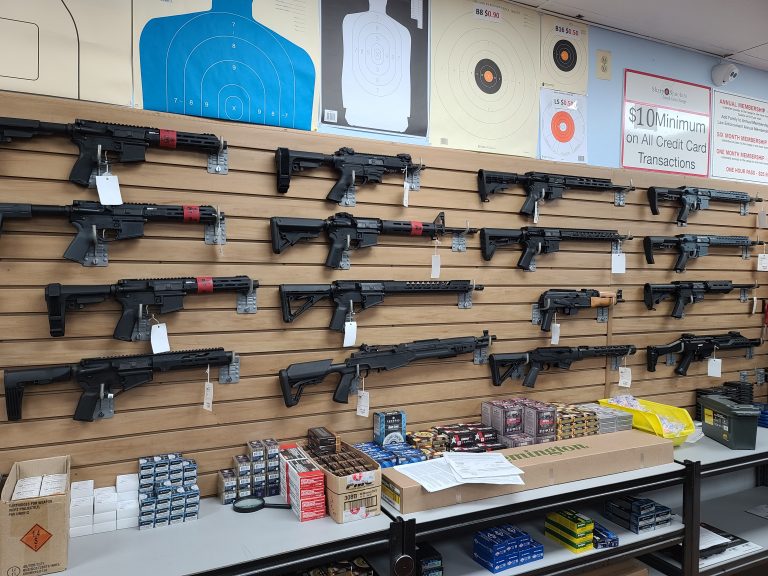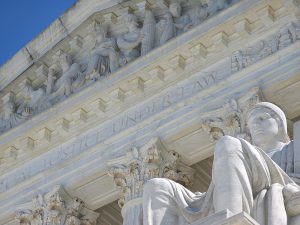One of the nation’s most prominent gun-control groups is trying to hold gun companies and the police liable for the Uvalde mass shooting.
Everytown Law is representing Sandra Torres, whose 10-year-old daughter was murdered during the attack, in her suit against the maker of the AR-15 used in the attack, the gun shop that sold it to the attacker, and a myriad of Uvalde law enforcement and school officials. Lawyers for the group claim that the AR-maker Daniel Defense (DD) was negligent in how it advertised the gun, and dealer Oasis Outback was negligent in selling it to the attacker. They further claim that Uvalde officials and individual officers on the scene are liable for their extended inaction during the shooting.
“The shooting in Uvalde was a horrific tragedy – and wholly preventable,” Eric Tirschwell, executive director of Everytown Law, said in a statement. “The massacre that killed Eliahna Torres and 20 others that day wasn’t just an act of one violent, troubled young man armed with an assault rifle. There are several actors responsible for putting the gun in his possession and failing to protect the children he attacked. This lawsuit is intended to hold them accountable.”
But all of these claims have been tried before in recent years, and none have resulted in actual court victories.
The arguments against the gun maker will sound very familiar to anybody who has followed these sorts of attempts to hold gun companies liable for the criminal acts of third parties that involve their products. They will also sound familiar to anybody who’s heard arguments that violent video games inspire real-world violence.
That’s because the complaint’s main argument against Daniel Defense is that the company advertised its popular AR-15 variant using military imagery, especially in the popular video game Call of Duty. It incorrectly states that DD’s gun was playable in the game but relies on the idea that the marketing was illegal because it encouraged customers to attack others. Everytown argues the company’s “unfair” marketing violates the Federal Trade Commission Act, which is designed to prevent unfair or deceptive ads.
“Daniel Defense’s marketing of its rifles to teenage and young adult men contributed to the shooting at Robb Elementary, and is responsible, in part, for the death of Eliahna Torres,” the complaint argues. “Daniel Defense markets its AR-15-style rifles to young male consumers by using militaristic imagery and video game references, by marketing on various social media platforms, and by suggesting that its rifles can be used by civilians for offensive combat-style operations against non-combatants.”
Despite the bold claims, as is common in these kinds of cases, the complaint provides no evidence that DD’s marketing ever encouraged anyone to commit illegal acts. Nor does it provide any evidence that the Uvalde shooter was directly or indirectly motivated to murder 19 children because DD’s ads included pictures of military members. The lawsuit doesn’t even offer evidence the shooter ever interacted with the company’s ads beyond claiming he played Call of Duty, one of the most popular video games in history.
Like the dozens that have come before it, the biggest problem for the case lies in the Protection of Lawful Commerce in Arms Act (PLCAA). That federal law protects gun companies from frivolous lawsuits which seek to hold them responsible for crimes carried out by others. It’s also why the suit focuses primarily on arguing DD’s advertising was illegal under federal law, rather than the also-included claim that selling AR-15s makes DD liable because it’s too dangerous for civilians to own (despite it being the most popular rifle in the country).
The PLCAA’s liability protection comes with an exception for negligence committed by the company, which is why you still see lawsuits over defective guns, and any situation where the company breaks a state or federal law in a way that contributes to the harm caused by somebody else. So, if DD’s advertising broke federal ad laws in a way that contributed to the Uvalde shooting, it could potentially be held liable for the attack.
The problem is nobody has actually won in court on a claim like this since the PLCAA took effect in 2005. Many have tried this route, but, with one notable recent exception, nearly all have been dismissed. Usually, the plaintiffs have even been forced to pay the defendants’ legal fees. Given the nature of these suits, that usually means victims’ families have been forced to pay gun companies at the end of these cases since they, not the gun-control groups backing the cases, are the actual named plaintiffs.
The claims against Oasis Outfitters are even thinner than those against DD. The complaint alleges the store acted negligently by selling the shooter guns and ammunition because of his age, that he wore dark clothes, and, literally, the “bad vibes” he gave off to other customers. That is the totality of the evidence offered in the complaint that Oasis ought to have known the shooter intended to carry out his attack, despite him passing a background check and being of age to buy the guns and ammo he purchased.
There is little reason to think this claim will go very far, given the sales were clearly legal.
The remainder of the suit will likely resonate with more people, even many gun-rights advocates. It frames the disastrous inaction of police during the attack, including the decision to wait over an hour to confront the shooter after he’d started killing children, as negligence that rises to the point where it violated the victims’ constitutional rights. And it makes a good case for how officers’ decisions to ignore active-shooter response protocols led to many of the victims’ deaths.
“[T]hey did not follow the first principle of active shooter response: immediately distract, isolate, and neutralize the active shooter,” the complaint said. “They did not do what they should have been trained to do: stop the killing.”
However, these arguments are not new either. There is quite a lot of case law that establishes, outside of a few very specific circumstances, police have no legal obligation to protect people. Most police likely have a strong desire to protect the public, and many have put their lives on the line to do so, but the simple fact is they have no legal responsibility to do so in nearly all circumstances.
As counter-intuitive as it may seem, that includes school shootings. And this has been tested multiple times before, including as recently as the 2018 Parkland shooting.
In 2020, the Eleventh Circuit ruled victims of the Parkland shooting could not sue the police department or individual officers involved in the botched response to that massacre under the theory that their 14th Amendment rights were violated. They found the lower court was correct to dismiss the suit because the students weren’t in the “custody” of the state while at school, and the police response or lack thereof didn’t rise to the level required for liability under the law.
“On the merits, the district court reasoned that because the students were not in a custodial relationship with the officials and failed to allege conduct by the officials that is ‘arbitrary’ or ‘shocks the conscience,’ the students could not maintain a claim that the officials violated their substantive right to due process of law,” the court wrote. “The students appeal this decision, but settled caselaw makes clear that official acts of negligence or even incompetence in this setting do not violate the right to due process of law.”
The court found the students weren’t in the state’s custody during school; therefore, police did not have a legal obligation to protect them as the attack unfolded.
“Ordinarily there are no custodial relationships in the public-school system, even if officials are aware of potential dangers or have expressed an intent to provide aid on school grounds,” the court ruled.
As in the new Uvalde case, the Parkland plaintiffs argued improper law enforcement training led to inaction that caused many deaths during the shooting. But the court found the plaintiffs would need to prove officials were actively seeking to harm the victims rather than just being incompetent.
“If the officials tried to protect the students—no matter how incompetently—then they did not act with the requisite malice[…],” the Eleventh Circuit said.
However, there is limited hope for Everytown’s claims in this case. Not in a court ruling but in a settlement.
There are recent examples of settlements on both fronts. Neither creates a legal precedent. So, they won’t be much help in court. But they offer the plaintiffs a potential light at the end of the tunnel.
Families of Sandy Hook victims were able to secure a $73 million settlement with the insurers of the now-defunct Remington Outdoors Company (ROC) earlier this year. The case got further in court than most when its claims against ROC’s advertising of the AR-15 variant used in that shooting, which were extremely similar to those in the new Uvalde case, survived early attempts to dismiss the entire case. After ROC went bankrupt, its former insurers decided the case was no longer worth litigating and settled instead.
Similarly, Parkland victims reached a $127.5 million settlement with the Department of Justice in March. Without admitting fault, the government agreed to pay out the settlement over the FBI’s failure to act on specific warnings that the Parkland shooter was going to attack the school.
However, the Uvalde suit likely has a steeper hill to climb to reach a settlement. Daniel Defense is unlikely to go bankrupt, and an operating gun company is far less likely to settle a case like this than risk-averse insurers of a defunct brand. Similarly, there isn’t yet evidence that law enforcement in Uvalde had the same kind of advanced warning of the attacker’s intentions.







4 Responses
Great article. While these lawsuits are unlikely to succeed, the defendants are forced to spend hundreds of thousands of dollars to defend themselves in court. Under the new method to evaluate the 2nd coming from the Bruen decision, these lawsuits are unconstitutional just based on the text “to keep and bear arms”. These types of lawsuits should be dismissed just based on SCOTUS caselaw.
And, of course we know of at least two SCOTUS rulings that exonerate responsibility from police who fail to act. Again, the lawsuit should be dismissed just based on SCOTUS caselaw.
I think the most likely outcome is that these claims do get dismissed, and the plaintiffs are forced to pay the defendants’ legal fees.
The “American Rule” generally holds that each side pays its own legal fees and costs in civil litigation. There are exceptions, typically provided by statute (over 200 at the federal level alone), and at common law, for the common benefit and for bad faith. The federal PLCAA does not address fee shifting, but according to Giffords, similar statues in Arkansas, Colorado, and Indiana do.
Like qualified immunity, the PLCAA and its state analogs are intended to act as a bar to litigation, circumventing large legal bills. Unfortunately, vehemently anti-gun states are chipping away at this protection, through misguided court rulings (e.g., Connecticut) and perverse statutes (e.g., California) that upend federal statutory fee shifting provisions.
Good points. Thank you for the extra detail there.